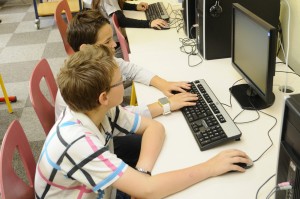
Public secondary schools in Orne will be gradually equipped with digital workspaces over the 2013/2014 school year.
In an educational context, a digital workspace is a shared work platform providing a number of dematerialised services specific to the national education system. Educational content, assignment books, timetables and general information on life at school will soon be online for anyone to consult from a computer or tablet.
A number of public partners are involved in rolling out these digital workspaces, including the departmental and regional councils and the national education authority. The digital workspace will be used by secondary schools and further education establishments and for the “digital schoolbag” system.
Five secondary schools in Orne will be involved in the first phase of roll-out when the new 2013/2014 school year begins.
The digital workspace project headed by the education authority and the region focuses on four priorities
- academic guidance to facilitate the move from secondary school to further education, and from college to higher education;
- academic achievement by facilitating links between primary and secondary schools, secondary schools and further education and significantly reducing drop-out rates;
- links within the educational community as a whole (pupils, teachers, parents, management staff, careers’ guidance and other school staff, the inspection services, etc.);
- opening up to the outside world with better integration of schools into their economic and social environment, as well as exchanges between schools and/or departmental, regional, national and international partners.
In real terms, tomorrow’s digital school will
- improve access to educational digital resources online. Pupils will be able to access documents, lesson materials, their timetables, assignment books, and other notes. Teachers can input information from home and exchange with colleagues and pupils.
- develop better links with families (maintaining contact with the school, consulting information on everyday issues (absences, meetings, canteen menus, school projects, etc.);
- strengthen links within the educational community (pupils, teachers, parents and staff);
- fit in with a sustainable development approach.
